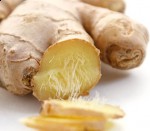 Ginger root is one of the most common Chinese herbs used in Traditional Chinese Medicine.
Ginger root is one of the most common Chinese herbs used in Traditional Chinese Medicine.
Ginger root has been used for tea, both medicinally and as a comfort food throughout Asia for generations. Today, many studies prove it's value in 21st century medical treatments.
The study on ginger root below is courtesy of the American Botanical Council. As an herbalist, I love everything about what the American Botanical Council stands for and what they have accomplished. Based in Austin, Texas, in their own words, they " are passionate about helping people live healthier lives through the responsible use of herbs, medicinal plants. We are an independent, nonprofit research and education organization dedicated to providing accurate and reliable information for consumers, health care practitioners, researchers, educators, industry and the media".
The American Botanical Council distributes a tremendous amount of reliable information on herbs and herbal studies, on Western herbs, Chinese herbs and Ayurvedic herbs, either way they are all botanicals. The study below on ginger root is just one of thousands of monographs they have published.
By: Amy C. Keller, PhD
Ginger (Zingiber officinale) root has been used around the world throughout history to treat stomach ailments, including nausea.1 A common, unpleasant adverse side effect of cancer treatment is chemotherapy-induced nausea and vomiting (CINV). In this clinical trial, the researchers set out to evaluate ginger root powder as a supplement to the antiemetic, intravenous pharmaceuticals ondansetron and dexamethasone. As the researchers mention, ginger successfully reduces CINV in adults in previous studies,2 they investigate the potential for ginger to alleviate CINV in children and young adults.
___________________________________________________________________________________________________________________________________________________________________________________________________________
References:
Pillai AK, Sharma KK, Gupta YK, Bakhshi S. Anti-emetic effect of ginger powder versus placebo as an add-on therapy in children and young adults receiving high emetogenic chemotherapy. Pediatr Blood Cancer. February 2011;56(2):234-238
1Blumenthal M, Goldberg A, Brinckmann J, eds. Herbal Medicine: Expanded Commission E Monographs. Austin, TX: American Botanical Council; Newton, MA: Integrative Medicine Communications; 2000.
2Ryan J, Heckler C, Dakhil S, et al. Ginger for chemotherapy-related nausea in cancer patients: a URCC CCOP randomized, double-blind, placebo-controlled clinical trial of 644 cancer patients. J Clin Oncol. 2009;27(15S):9511.

